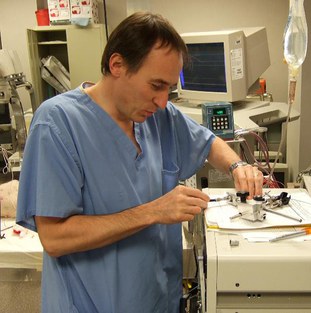Frequently Asked Questions
Q1: Why studying Biomedical Engineering
The health care sector and biomedical industry are complex and challenging environments to work in, and the boundary conditions can be quite different from traditional industries. The requirements imposed on a medical device –particularly for implants – can be extremely strict, and the process from device design to a final medical product easily takes several years. It is not sufficient for new products to be technically superior and completely safe for the patient; one will also have to demonstrate that they perform better than the existing clinical standard, effectively improving the diagnosis or treatment of the patient, in an ethically and socio-economically justifiable way. Medical practice is “evidence based”.

“...The sensation you get when, after years of development by the technical R&D team, the first patient is successfully treated with the new device under your responsibility, is unrivalled.”...
“...In my opinion, there is no other field where the innovations and technical developments will have a larger impact on the world of tomorrow as biomedical engineering...”
dr. ir. Hendrik Lambert, Director Clinical, Regulatory and Quality Assurance with ENDOSENSE.
Q2: Career perspectives?
Q3: Do I have the right background
- Check out here.
Q4: Tuition fees for EEA and non-EEA students
- The same fees apply at UGent and VUB
- More info on this link.
Q5: Scholarships
Students with excellent grades can get nominated by the study programme committee for a
- Master Mind (Flemish Community)
- Top-Up grant at Ghent University
- Grants at VUB
Q6: Why should I study in Gent?
- Ghent University, founded in 1817, is systematically ranked in the top 100 -200 in all university rankings
- The program is taught by renown experts in biomaterials, (computational) biomechanics, neuro-engineering, medical imaging, medical device technology, …
- Personal guidance and tutoring by our staff, who will assist you in shaping your own personalized track (30 credits electives) in the master program
- Hands-on projects in biomedical product development, projects within the hospital, internships in industry and hospitals
- Ample choice for master thesis topic in various biomedical engineering disciplines
- Gent has a flourishing ecosystem for medical and biotechnology thanks to the presence of top notch research institutes such as VIB and imec
- Ghent University embraces entrepreneurship and innovation, and has established the “student-entrepreneur” statute.
- You can combine your studies in Gent with an Erasmus exchange of 6 months or 1 year with one of our network partners in Italy, Norway, Switzerland, …
- You reside in Gent, a most beautiful Flemish art city, a short train ride away from Brussels, Paris, London, …
- You will be welcomed by our enthusiastic student association BEAM (Biomedical engineering and more)
- We are proud of Belgium’s political choice to ensure accessibility of university education for all, leading to tuition fees that are a fraction of those in many other countries, also for international students. On top, institutional and governmental top-up grants are provided on a competitive basis.
- Movie with a word of explanation from Prof. Patrick Segers.